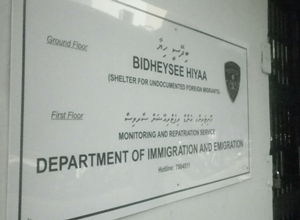Police have dismissed claims that an attack last month on a senior reporter for private broadcaster Raajje TV was politically motivated.
Journalist Ibrahim Waheed (Aswad) was left requiring major surgery abroad after he was beaten unconscious with an iron bar while riding on a motorcycle near the artificial beach area of Male’ on February 23. He was reported at the time to be on his way to see two Maldives Broadcasting Corporation (MBC) journalists who were admitted to hospital after being attacked.
National media bodies have since raised concerns about a growing number of attacks on journalists. The same bodies have also claimed that reporters and other media figures needed to be more professional in order to ensure similar incidents and attacks can be better “contained and controlled” in future.
The police’s Head of Serious and Organised Crime Department Mohamed Daud declared at a press conference today that Aswad’s assault should not be viewed as a politically motivated attack, or an attempt to silence national media.
The claims were made as police announced that two suspects – an 18 year-old and 21 year-old – had been arrested in connection to what was believed to be a “planned” attack on Aswad.
Daud told local media that both suspects had criminal records and were believed to belong to “groups” based in the capital, though no further details were provided as police continue their investigations.
Speaking following the press conference, Police Spokesperson Sub-Inspector Hassan Haneef today told Minivan News that with investigations continuing into Aswad’s attack, no motive had so far been established.
Following the arrest yesterday (March 12) of a second suspect in connection to the attack, Haneef added that the police investigation had so far found no evidence to imply a political motivation or that Aswad had been assaulted due to his role as a senior reporter for Raajje TV.
Targeted attack
Addressing Daud’s claims today, Maldives Journalist Association (MJA) President Ahmed ‘Hiriga’ Zahir said he would not speak contrary to the police view on the case. However, he maintained that Aswad had been specifically targeted by his attackers.
“We cannot investigate the matter ourselves, so I cannot go against what the police have said. However, what I know is that Aswad is a journalist and he was attacked whilst out on a motorbike,” he said. “It was a targeted attack.”
The attack on Aswad was the most serious incident of violence against a journalist in the Maldives since July 2012, when a group of alleged Islamic radicals slashed the throat of blogger Hilath Rasheed. Rasheed, who had been campaigning for religious tolerance, narrowly survived and has since fled the country.
Aside from the attack on Aswad, Hiriga continued to express concern at what he believed were a growing number of attacks on journalists of late, notably following recent anti-government demonstrations in the capital.
Just last week, a journalist for private media group Sun and a cameraman from broadcaster Villa Television (VTV) were attacked near to the residence of former President Mohamed Nasheed during coverage of his arrest.
Two Television Maldives (TVM) journalists were also attacked with an irritant while covering protests on Sosun Magu in Male’ on the same night Aswad was assaulted.
“Too many opinions”
Following Aswad’s attack, National media bodies including the MJA last month called on journalists to act more professionally to prevent future confrontations between themselves and the public.
Senior figures from both Maldives Journalist Association (MJA) and Maldives Broadcasting Commission (MBC) said that journalists needed to act in a more professional manner in order to help prevent future confrontations between the public and reporters.
MBC Vice President Mohamed Shahyb told Minivan News that journalists have been targeted because “hatred has been building” towards them over a long period of time.
“Some journalists are not doing their work professionally in the Maldives. The biggest problem is that they do not have much education or training [in journalism] and because of that they write anything,” Shahyb told Minivan News. “If the professional standard can be maintained, similar incidents can be contained and controlled.”
The MBC Vice President claimed that there are “too many opinions” leaking into news reports and that politicians need to start “pointing their fingers” at journalists who are not working in the correct manner.
“Social networking is also a big problem. Even if they work professionally, they then go onto social media sites and start expressing their own personal feelings, this is an issue,” Shahyb said.
MJA President, Ahmed ‘Hiriga’ Zahir, expressed similar concern, adding that journalists need to be more impartial with their reporting.
“We need to encourage media to be more objective. When we listen to the TV or radio we can’t tell the difference between an opinion piece or the actual news itself.”
Zahir has also requested the media to act more professionally and stop “spreading hatred”, while calling for police to give greater protection to journalists.
President Dr Mohamed Waheed Hassan Manik has also of late called on the media to “encourage stability, unity and harmony” in the country, adding that those responsible for the attacks will be brought to justice.






